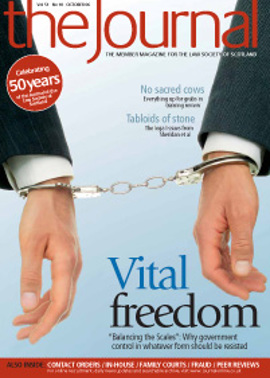Purchases under test

For most licensing practitioners, the fact that a small part of the Licensing (Scotland) Act 2005 is in force will be irrelevant, and may even have escaped their notice; however, for those of us who practise in, or advise clients, in Fife, the change is having a significant effect.
Parts of s 105 of the 2005 Act have been brought into force. In summary this allows the police to authorise a young person to attempt to purchase alcohol to test whether the law is being adhered to. The police will point out that it is often very difficult to prove how drink has been acquired by young people, and therefore difficult to get to the root of the problem. The scheme is being tested in Fife, and came into effect on 1 June 2006.
Fife police have been sending 16 year olds into licensed premises to attempt to purchase alcohol. If challenged they must admit their true age. At the time of writing there have been 337 test purchases, with 49 failures. The police practice is to advise licensees of the failure, and to advise that there will be a second test purchase within a week. The police are being coy about revealing what action they are taking in the event of a single failure – one does wonder if 337 summary complaints under s 68 are in preparation: I think not.
Suspension before trial
Thus far there have been three double failures, and the first licensee had his licence suspended for three months. The procedures currently being followed raise some important legal issues. The suspension hearing took place despite there being criminal proceedings pending. No evidence was led: the matter proceeded by ex parte statements. It was argued on behalf of the licensee (I must declare an interest, in that I was acting) that it was unfair for the matter to proceed in advance of the trial, as there was no opportunity to run the due diligence defence, namely that the licensee (who had not been present when either sale took place) had exercised all due diligence to prevent the occurrence of the offence. It was argued that the due diligence defence could be established in this particular case. This was not contradicted by the police. The client decided to accept the suspension and waived the right to obtain written reasons, to ensure the suspension would be served by Christmas.
Questions for the future
It would have been interesting to read the reasons, and, in particular, to see how the board had approached the due diligence issue. Sources on the police side have expressed the view that due diligence is relevant only in the context of a criminal defence, and the fact of the two failures by itself renders the licensee “not fit and proper” to hold a licence. This is quite a remarkable viewpoint. While it may not accurately reflect the view of the chief constable, it could have some interesting consequences. What will happen if the courts uphold the due diligence defence and hold that no offence has taken place? Will the licensee have a claim for compensation? If so, against whom? How does that sit with the human rights legislation, in that it is arguable that an individual has been deprived of a possession (a licence is a possession for the purposes of ECHR) without a fair and public hearing? Can a hearing be fair if the presumption of innocence is apparently ignored, and there is no opportunity to prove a due diligence defence? A fundamental flaw lies in assuming that because a sale has taken place an offence has been committed. This strict responsibility test was discussed by the Clayson committee and rejected. It forms no part of our law.
There is also an interesting technical argument that the police actings are illegal, notwithstanding the change to the law. Section 68(5) of the 1976 Act remains in force, meaning that it remains an offence knowingly to send a person under 18 for the purpose of obtaining alcoholic liquor. What are the consequences of a procedure which flows from an illegal act?
There is no doubt that there will be other cases. If licensing boards flex their muscles against bigger opponents than a wee independent store in Methil, there will be some interesting litigation to report.
Tom Johnston, Young & Partners LLP, Dunfermline
In this issue
- TUPE passes the buck (1)
- Survival of the fittest? A reply
- Channels of communication
- Time to discard the PIPs
- Speaking in the public interest
- Education's Big Bang
- If you can't say anything nice...
- Lesbian families, parenthood and contact
- Keep it in the family
- End of the peer show
- New chambers challenges Faculty Services
- Cash without borders
- Fraud - the threat from within
- Note it down - or lose out
- Balancing privacy and data sharing
- Provoking argument
- To amend or not to amend?
- Purchases under test
- TUPE passes the buck
- Scottish Solicitors' Discipline Tribunal
- Website reviews
- Book reviews
- Law or regulation? The blurring gets more blurred
- Registers success with direct debit






